Chuanhao Li
ProSoftArena: Benchmarking Hierarchical Capabilities of Multimodal Agents in Professional Software Environments
Dec 30, 2025Abstract:Multimodal agents are making rapid progress on general computer-use tasks, yet existing benchmarks remain largely confined to browsers and basic desktop applications, falling short in professional software workflows that dominate real-world scientific and industrial practice. To close this gap, we introduce ProSoftArena, a benchmark and platform specifically for evaluating multimodal agents in professional software environments. We establish the first capability hierarchy tailored to agent use of professional software and construct a benchmark of 436 realistic work and research tasks spanning 6 disciplines and 13 core professional applications. To ensure reliable and reproducible assessment, we build an executable real-computer environment with an execution-based evaluation framework and uniquely incorporate a human-in-the-loop evaluation paradigm. Extensive experiments show that even the best-performing agent attains only a 24.4\% success rate on L2 tasks and completely fails on L3 multi-software workflow. In-depth analysis further provides valuable insights for addressing current agent limitations and more effective design principles, paving the way to build more capable agents in professional software settings. This project is available at: https://prosoftarena.github.io.
Yume-1.5: A Text-Controlled Interactive World Generation Model
Dec 26, 2025Abstract:Recent approaches have demonstrated the promise of using diffusion models to generate interactive and explorable worlds. However, most of these methods face critical challenges such as excessively large parameter sizes, reliance on lengthy inference steps, and rapidly growing historical context, which severely limit real-time performance and lack text-controlled generation capabilities. To address these challenges, we propose \method, a novel framework designed to generate realistic, interactive, and continuous worlds from a single image or text prompt. \method achieves this through a carefully designed framework that supports keyboard-based exploration of the generated worlds. The framework comprises three core components: (1) a long-video generation framework integrating unified context compression with linear attention; (2) a real-time streaming acceleration strategy powered by bidirectional attention distillation and an enhanced text embedding scheme; (3) a text-controlled method for generating world events. We have provided the codebase in the supplementary material.
SVBench: Evaluation of Video Generation Models on Social Reasoning
Dec 25, 2025Abstract:Recent text-to-video generation models exhibit remarkable progress in visual realism, motion fidelity, and text-video alignment, yet they remain fundamentally limited in their ability to generate socially coherent behavior. Unlike humans, who effortlessly infer intentions, beliefs, emotions, and social norms from brief visual cues, current models tend to render literal scenes without capturing the underlying causal or psychological logic. To systematically evaluate this gap, we introduce the first benchmark for social reasoning in video generation. Grounded in findings from developmental and social psychology, our benchmark organizes thirty classic social cognition paradigms into seven core dimensions, including mental-state inference, goal-directed action, joint attention, social coordination, prosocial behavior, social norms, and multi-agent strategy. To operationalize these paradigms, we develop a fully training-free agent-based pipeline that (i) distills the reasoning mechanism of each experiment, (ii) synthesizes diverse video-ready scenarios, (iii) enforces conceptual neutrality and difficulty control through cue-based critique, and (iv) evaluates generated videos using a high-capacity VLM judge across five interpretable dimensions of social reasoning. Using this framework, we conduct the first large-scale study across seven state-of-the-art video generation systems. Our results reveal substantial performance gaps: while modern models excel in surface-level plausibility, they systematically fail in intention recognition, belief reasoning, joint attention, and prosocial inference.
Code-in-the-Loop Forensics: Agentic Tool Use for Image Forgery Detection
Dec 18, 2025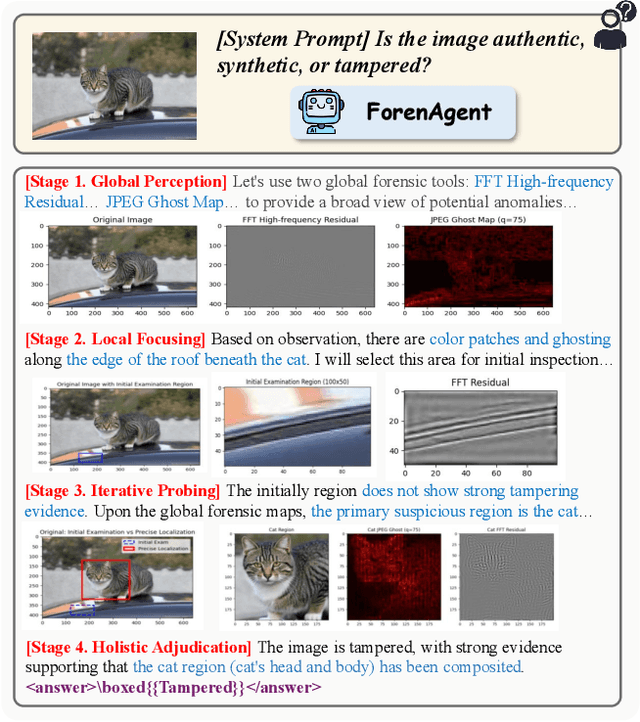
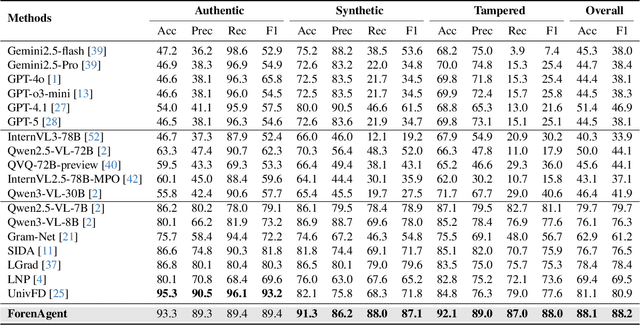
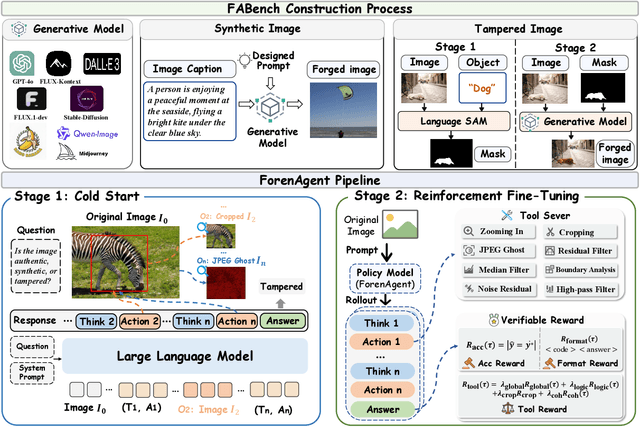
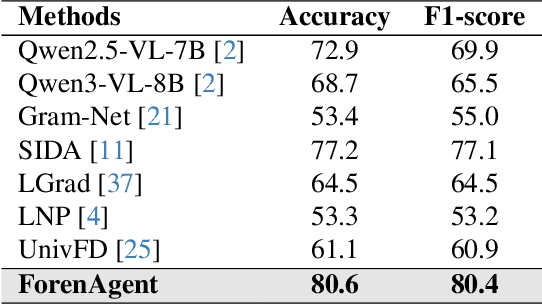
Abstract:Existing image forgery detection (IFD) methods either exploit low-level, semantics-agnostic artifacts or rely on multimodal large language models (MLLMs) with high-level semantic knowledge. Although naturally complementary, these two information streams are highly heterogeneous in both paradigm and reasoning, making it difficult for existing methods to unify them or effectively model their cross-level interactions. To address this gap, we propose ForenAgent, a multi-round interactive IFD framework that enables MLLMs to autonomously generate, execute, and iteratively refine Python-based low-level tools around the detection objective, thereby achieving more flexible and interpretable forgery analysis. ForenAgent follows a two-stage training pipeline combining Cold Start and Reinforcement Fine-Tuning to enhance its tool interaction capability and reasoning adaptability progressively. Inspired by human reasoning, we design a dynamic reasoning loop comprising global perception, local focusing, iterative probing, and holistic adjudication, and instantiate it as both a data-sampling strategy and a task-aligned process reward. For systematic training and evaluation, we construct FABench, a heterogeneous, high-quality agent-forensics dataset comprising 100k images and approximately 200k agent-interaction question-answer pairs. Experiments show that ForenAgent exhibits emergent tool-use competence and reflective reasoning on challenging IFD tasks when assisted by low-level tools, charting a promising route toward general-purpose IFD. The code will be released after the review process is completed.
Composition-Incremental Learning for Compositional Generalization
Nov 12, 2025Abstract:Compositional generalization has achieved substantial progress in computer vision on pre-collected training data. Nonetheless, real-world data continually emerges, with possible compositions being nearly infinite, long-tailed, and not entirely visible. Thus, an ideal model is supposed to gradually improve the capability of compositional generalization in an incremental manner. In this paper, we explore Composition-Incremental Learning for Compositional Generalization (CompIL) in the context of the compositional zero-shot learning (CZSL) task, where models need to continually learn new compositions, intending to improve their compositional generalization capability progressively. To quantitatively evaluate CompIL, we develop a benchmark construction pipeline leveraging existing datasets, yielding MIT-States-CompIL and C-GQA-CompIL. Furthermore, we propose a pseudo-replay framework utilizing a visual synthesizer to synthesize visual representations of learned compositions and a linguistic primitive distillation mechanism to maintain aligned primitive representations across the learning process. Extensive experiments demonstrate the effectiveness of the proposed framework.
Dialogue as Discovery: Navigating Human Intent Through Principled Inquiry
Oct 31, 2025Abstract:A fundamental bottleneck in human-AI collaboration is the "intention expression gap," the difficulty for humans to effectively convey complex, high-dimensional thoughts to AI. This challenge often traps users in inefficient trial-and-error loops and is exacerbated by the diverse expertise levels of users. We reframe this problem from passive instruction following to a Socratic collaboration paradigm, proposing an agent that actively probes for information to resolve its uncertainty about user intent. we name the proposed agent Nous, trained to acquire proficiency in this inquiry policy. The core mechanism of Nous is a training framework grounded in the first principles of information theory. Within this framework, we define the information gain from dialogue as an intrinsic reward signal, which is fundamentally equivalent to the reduction of Shannon entropy over a structured task space. This reward design enables us to avoid reliance on costly human preference annotations or external reward models. To validate our framework, we develop an automated simulation pipeline to generate a large-scale, preference-based dataset for the challenging task of scientific diagram generation. Comprehensive experiments, including ablations, subjective and objective evaluations, and tests across user expertise levels, demonstrate the effectiveness of our proposed framework. Nous achieves leading efficiency and output quality, while remaining robust to varying user expertise. Moreover, its design is domain-agnostic, and we show evidence of generalization beyond diagram generation. Experimental results prove that our work offers a principled, scalable, and adaptive paradigm for resolving uncertainty about user intent in complex human-AI collaboration.
From Pixels to Paths: A Multi-Agent Framework for Editable Scientific Illustration
Oct 31, 2025Abstract:Scientific illustrations demand both high information density and post-editability. However, current generative models have two major limitations: Frist, image generation models output rasterized images lacking semantic structure, making it impossible to access, edit, or rearrange independent visual components in the images. Second, code-based generation methods (TikZ or SVG), although providing element-level control, force users into the cumbersome cycle of "writing-compiling-reviewing" and lack the intuitiveness of manipulation. Neither of these two approaches can well meet the needs for efficiency, intuitiveness, and iterative modification in scientific creation. To bridge this gap, we introduce VisPainter, a multi-agent framework for scientific illustration built upon the model context protocol. VisPainter orchestrates three specialized modules-a Manager, a Designer, and a Toolbox-to collaboratively produce diagrams compatible with standard vector graphics software. This modular, role-based design allows each element to be explicitly represented and manipulated, enabling true element-level control and any element can be added and modified later. To systematically evaluate the quality of scientific illustrations, we introduce VisBench, a benchmark with seven-dimensional evaluation metrics. It assesses high-information-density scientific illustrations from four aspects: content, layout, visual perception, and interaction cost. To this end, we conducted extensive ablation experiments to verify the rationality of our architecture and the reliability of our evaluation methods. Finally, we evaluated various vision-language models, presenting fair and credible model rankings along with detailed comparisons of their respective capabilities. Additionally, we isolated and quantified the impacts of role division, step control,and description on the quality of illustrations.
MDK12-Bench: A Comprehensive Evaluation of Multimodal Large Language Models on Multidisciplinary Exams
Aug 09, 2025Abstract:Multimodal large language models (MLLMs), which integrate language and visual cues for problem-solving, are crucial for advancing artificial general intelligence (AGI). However, current benchmarks for measuring the intelligence of MLLMs suffer from limited scale, narrow coverage, and unstructured knowledge, offering only static and undifferentiated evaluations. To bridge this gap, we introduce MDK12-Bench, a large-scale multidisciplinary benchmark built from real-world K-12 exams spanning six disciplines with 141K instances and 6,225 knowledge points organized in a six-layer taxonomy. Covering five question formats with difficulty and year annotations, it enables comprehensive evaluation to capture the extent to which MLLMs perform over four dimensions: 1) difficulty levels, 2) temporal (cross-year) shifts, 3) contextual shifts, and 4) knowledge-driven reasoning. We propose a novel dynamic evaluation framework that introduces unfamiliar visual, textual, and question form shifts to challenge model generalization while improving benchmark objectivity and longevity by mitigating data contamination. We further evaluate knowledge-point reference-augmented generation (KP-RAG) to examine the role of knowledge in problem-solving. Key findings reveal limitations in current MLLMs in multiple aspects and provide guidance for enhancing model robustness, interpretability, and AI-assisted education.
Yume: An Interactive World Generation Model
Jul 23, 2025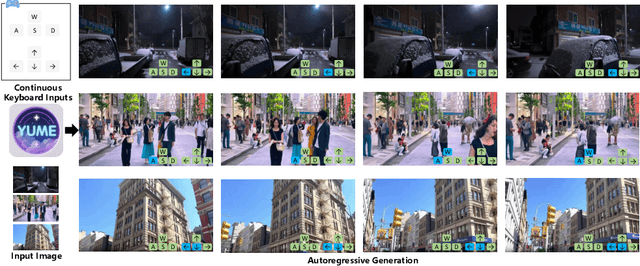
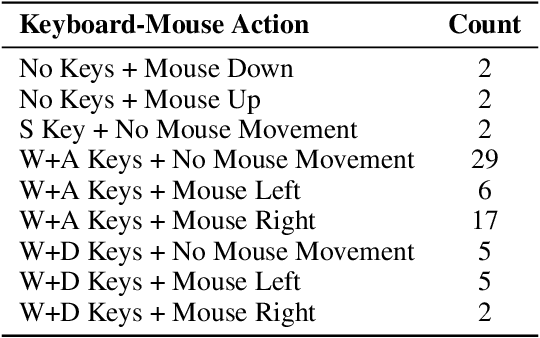
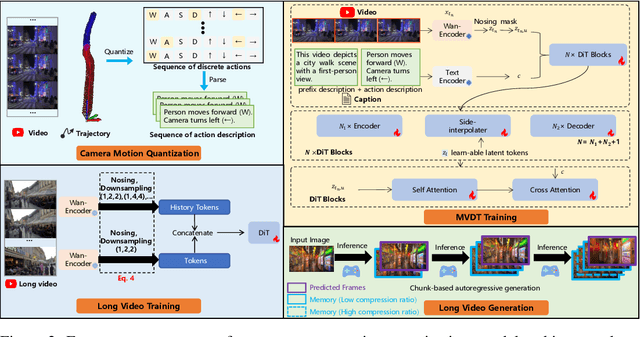

Abstract:Yume aims to use images, text, or videos to create an interactive, realistic, and dynamic world, which allows exploration and control using peripheral devices or neural signals. In this report, we present a preview version of \method, which creates a dynamic world from an input image and allows exploration of the world using keyboard actions. To achieve this high-fidelity and interactive video world generation, we introduce a well-designed framework, which consists of four main components, including camera motion quantization, video generation architecture, advanced sampler, and model acceleration. First, we quantize camera motions for stable training and user-friendly interaction using keyboard inputs. Then, we introduce the Masked Video Diffusion Transformer~(MVDT) with a memory module for infinite video generation in an autoregressive manner. After that, training-free Anti-Artifact Mechanism (AAM) and Time Travel Sampling based on Stochastic Differential Equations (TTS-SDE) are introduced to the sampler for better visual quality and more precise control. Moreover, we investigate model acceleration by synergistic optimization of adversarial distillation and caching mechanisms. We use the high-quality world exploration dataset \sekai to train \method, and it achieves remarkable results in diverse scenes and applications. All data, codebase, and model weights are available on https://github.com/stdstu12/YUME. Yume will update monthly to achieve its original goal. Project page: https://stdstu12.github.io/YUME-Project/.
Sekai: A Video Dataset towards World Exploration
Jun 18, 2025Abstract:Video generation techniques have made remarkable progress, promising to be the foundation of interactive world exploration. However, existing video generation datasets are not well-suited for world exploration training as they suffer from some limitations: limited locations, short duration, static scenes, and a lack of annotations about exploration and the world. In this paper, we introduce Sekai (meaning ``world'' in Japanese), a high-quality first-person view worldwide video dataset with rich annotations for world exploration. It consists of over 5,000 hours of walking or drone view (FPV and UVA) videos from over 100 countries and regions across 750 cities. We develop an efficient and effective toolbox to collect, pre-process and annotate videos with location, scene, weather, crowd density, captions, and camera trajectories. Experiments demonstrate the quality of the dataset. And, we use a subset to train an interactive video world exploration model, named YUME (meaning ``dream'' in Japanese). We believe Sekai will benefit the area of video generation and world exploration, and motivate valuable applications.
 Add to Chrome
Add to Chrome Add to Firefox
Add to Firefox Add to Edge
Add to Edge